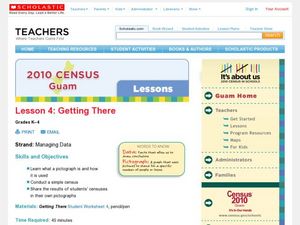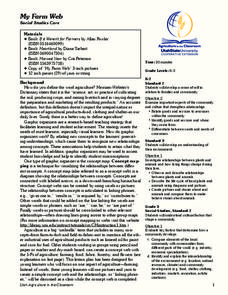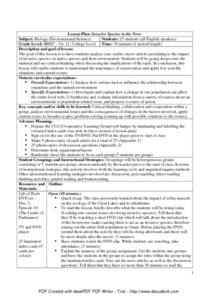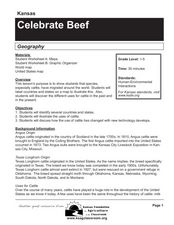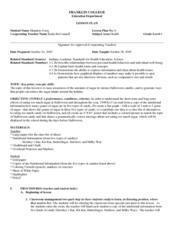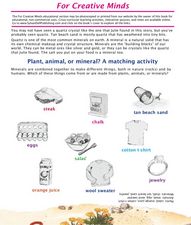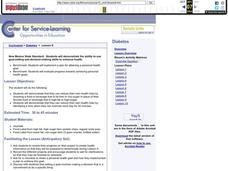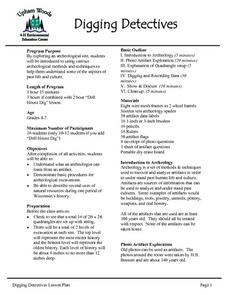Curated OER
What's Organic?
Students define and discuss terms organic and synthetic, read article pertaining to organic agricultural practices in Oklahoma, complete worksheet, grow plants using both commercial and organic fertilizer, compare growth rates, and chart...
Curated OER
Diet: Find the Carbohydrates
Students discover and discuss the functions of carbohydrates. Once they have taken notes and completed worksheets, they perform experiments using iodine to test for starch. Lesson topics include how carbohydrates are processed by the...
Curated OER
Getting There
Pupils practice reading a pictograph. In this data analysis instructional activity, students collect data and create their own pictograph. A pupils worksheet is included.
Curated OER
If These Walls Could Talk: Seeing a Culture Through Human Features
Students read Talking Walls and discuss the walls presented and their importance to the culture. In this geography lesson, students locate and label each country/continent discussed in the book on a world map. Students take a walk and...
Curated OER
Energy in Living Systems
Students are asked: Is our life's purpose over when it's over? What happens to our bodies? They analyze the flow of energy through living systems. Students compare the metabolism of autotrophs with that of heterotrophs. They create a...
Curated OER
Farm Animals - Mothers and Babies - "Are You My Baby?"
Students listen to a teacher read aloud and discuss the farm animals. They participate in an role playing activity that explains how mother mammals recognize their young by their scent.
Curated OER
Parts of a Plant
Students explore biology by listening to an in-class lecture. In this plant science lesson, students sing songs with their classmates regarding anatomical parts of a plant and create plants from arts and crafts materials. Students listen...
Curated OER
Grocery Shopping
Students build a functional vocabulary. In this ESL lesson plan, students watch a video that incorporates a lesson plan using "do" and "does" while grocery shopping. Students engage in a listening exercise where they listen for specific...
Curated OER
My Farm Web
Students examine the role of agriculture in everyday life. In this agriculture activity, students read books such as Harvest Year and identify products which from from the farm. Students fill in a word web using the knowledge they gained...
Curated OER
Invasive Species in the News
Students explore how invasive species can change an environment. In this critical thinking instructional activity, students study how invasive animals can change an environments population. They will discuss the implications of an...
Curated OER
Vegetarianism
Students classify ways to stick on a vegetarian diet. Students survey the reasons why others make it or fail on these types of diets. Students aim to improve their understanding of vegetarianism.
Curated OER
Celebrate Beef
Students read about the history of cattle, discover new technologies, and fill out worksheets about cattle use. In this cattle lesson plan, students identify states that raise cattle and draw pictures of how cattle is used.
Curated OER
Beautiful Bovine
Students compare and contrast a human body to a cow. Using a diagram, they label and identify the functions of the cow's numerous parts. In groups, they create a Venn Diagram to compare the various types of cows with one another. They...
Curated OER
Halloween Candy/ Sugar Content
Fourth graders examine the amount of sugar contained in Halloween candy by looking at nutritional labels from candy bars. They figure out ways to encourage people to reduce the amount of sugar they eat at this holiday. They look at the...
Curated OER
Microbe Experimentation
Seventh graders study microorganisms in their environments by experimenting with milk products. In this microbes lesson, 7th graders read background information about microorganisms in yogurt and soured milk. Students then follow a...
Curated OER
For Creative Minds
Students study pictures of plants, animals, and minerals. Students classify the pictures into the three groups. In this rock identification lesson, students complete a rock finding lab experiment by finding, cleaning, identifying, and...
Curated OER
The Solar System: Why do we Explore?
Third graders act as scientists. In this property discovery lesson, 3rd graders explore the substance "Oobleck" (cornstarch, water, food coloring). They work in groups to investigate the substance and make observations as a scientist...
Curated OER
DIBETES
Student demonstrates that they can reduce their own health risks by choosing a food or beverage that is fat free or non-sugar in place of their favorite food or beverage that is high-fat or high-sugar. Student identifies a time for...
Curated OER
Five a Day
Students look up and print definitions of fruit and vegatable. They write down their food intake for three days. They identify and categorize fruits and vegetables. They research how fruits and vegetables grow. They bring in their...
Curated OER
Earth Epochs
Students explore earth epochs, i.e, Permian, Precambrian, Cambrian, Ordivician and through pictures they see what life on Earth and animals looked like. They organize Earth Epochs according to years going from greatest to least...
Curated OER
Digging Detectives
Students demonstrate basic procedures for archeological excavations. They explore an archeological site, students using various archeological methods and techniques to determine some of the aspects of past life and culture.
Curated OER
Keeping Warm
Fifth graders measure the temperature of water using a thermometer. They record the temperatures of water on a chart. Students use the temperature data to determine which materials are the best conductors of heat. They discuss their...
Curated OER
Would You Drink This?
Students examine how they affect water quality of those who live downstream after identifying rivers and river basins in Kansas.
Curated OER
Growing Jack and the Beanstalk Plants
First graders investigate how plants grow by growing their own "beanstalk", (after reading "Jack and the Beanstalk") and record their observations daily in a science journal.


